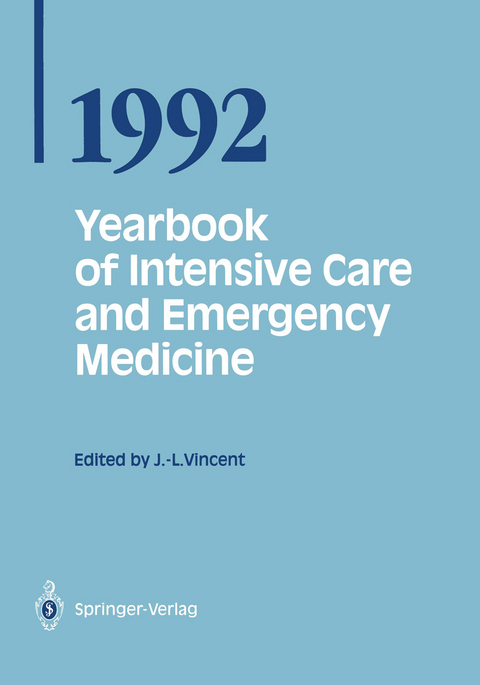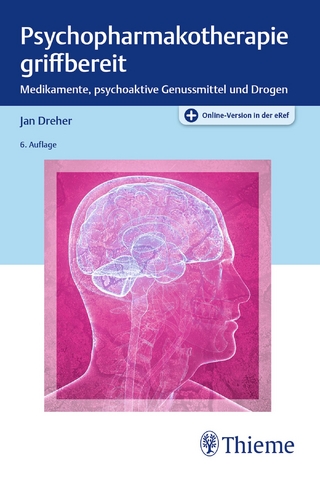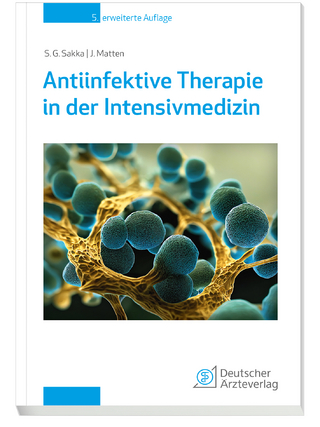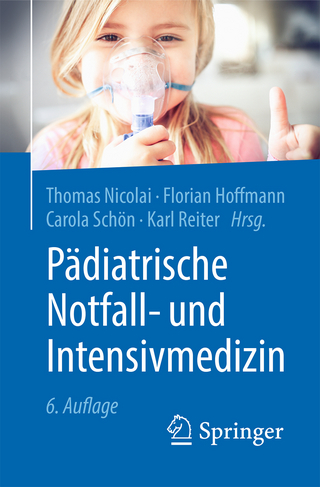
Yearbook of Intensive Care and Emergency Medicine 1992
Springer Berlin (Verlag)
978-3-540-55241-3 (ISBN)
Multiple Organ Failure: A Cascade of Mediators.- Multiple Organ Failure and Infection: Cause, Consequence, or Coincidence.- The Role of the Endothelium in Multiple Organ Failure.- The Role of Interleukin-1 in Septic Shock.- Cytokines and Cytokine Antagonists in Sepsis and Critical Illness.- Tumor Necrosis Factor during Sepsis.- Interactions between TNF? and Human Polymorphonuclear Leukocytes.- Determinants of Neutrophil Adhesion Following Ischemia.- Factors Determining Endotoxin Sensitivity.- Mechanisms of Endotoxin Induced Endothelial Injury.- Novel Approaches to the Treatment of Septic Shock.- Biochemical Alterations in Ischemia and Reperfusion.- Prostanoids and Sepsis.- Cardiac Failure.- Cardiac Complications of Local Anesthetic Agents.- Perioperative Cardiac Morbidity: New Developments and Controversies.- Perioperative Heart Failure.- Phosphodiesterase Inhibitors for Treating Low-Output Syndrome.- Doppler-Echocardiography in Critically Ill Patients.- Lung Edema-Pulmonary Hemodynamics.- Acute Cardiogenic Pulmonary Edema.- The Alveolar Epithelial Barrier.- Physiological Assessment of Acute Lung Injury in the Intensive Care Unit.- Morphology of Pulmonary Vasoconstriction and Vasodilation.- Effects of Inhaled Nitric Oxide in Volunteers.- Gut Ischemia.- Pathophysiology of Gut Mucosal Barrier Breakdown in Shock.- Alterations in Gastrointestinal Barrier Function in Sepsis: The Effect of Lipopolysaccharide on Mucosal Permeability to Hydrophilic Solutes.- The Potential for Monitoring Gastric Intramucosal pH to Reduce the Costs of Critical Care.- Cellular Hypoxia.- Oxygen Delivery and Uptake: Insights from Animal Studies.- Tissue Hypoxia in Animal Models of Sepsis.- The Role of O2 Transport Related Variables in the Assessment of Tissue Oxygenation in the Clinical Setting.-Influences of Various Respiratory and Circulatory Conditions on Muscle Tissue Oxygenation in Critically Ill Patients.- Is Oxygen Consumption an Important Clinical Target?.- Respiratory Support.- Respiratory Resistances in Mechanically Ventilated Patients: The Effects of PEEP.- Assessment of Respiratory Mechanics During Total and Partial Ventilatory Support.- Synchronous and Dys-synchronous Patient-Ventilator Interactions.- Prevention of Bronchopulmonary Dysplasia by New Ventilatory Techniques.- Respiratory Failure in Asthma: Management of the Mechanically Ventilated Patient.- Approaches to Improve Survival in Severe ARDS.- The Place of Extracorporeal CO2 Removal in the Treatment of ARDS.- Difficult Weaning.- Respiratory Monitoring.- Continuous Intra-Arterial Blood Gas Monitoring.- The Expiratory Capnogram in Mechanically Ventilated Patients.- Respiratory Inductive Plethysmography for Assessing Risk of Pulmonary Barotrauma.- Evaluation of Pulmonary Mechanics in Mechanically Ventilated Children.- Infectious Complications.- General Concepts for Antimicrobial Prophylaxis in Surgery.- Intrinsic Antibiotic Resistance in Pseudomonas Aeruginosa.- Incidence and Risk Factors of ICU Acquired Pneumonia.- Pneumonia in the Intensive Care Unit: Can Critical Care Technology Help?.- Cardiopulmonary Resuscitation.- Out-of-Hospital Cardiac Arrest.- Caring for Children with Poor Outcomes from Out-of-Hospital Arrests.- Myocardial Dysfunction after Successful Cardiac Resuscitation.- Current Concepts in Brain Resuscitation.- CNS Injury and Trauma.- The Role of Free Radicals in Ischemic and Reperfusion Brain Injury.- Brain Edema and Raised Intracranial Pressure after Head Injury.- Cerebrovascular Effects of Hypertonic Resuscitation.- The 21-Aminosteroid Antioxidant Tirilazad Mesylate in CNS Injury and Hemorrhagic Shock.- Neuro-Hormonal Regulation after Trauma.- Organ Transplantation.- Acute Allograft Rejection: Immunobiology and Therapeutic Strategies.- Immunosuppression in a Critically Ill Patien.- Nutrition and Metabolism.- Enterai Nutrition for the Critically Ill.- Calcium Homeostasis during Sepsis.- Intensive Care Sedation.- Toxicology.- Major Chemical Accidents: Medical and Organizational Aspects.- Place of Activated Charcoal and Gastric Emptying in Acute Toxic Ingestions: A Critical Reappraisal.- Organization and Evaluation.- A Survey of Emergency Medical Service Systems in Europe.- Prediction of Outcome in Critically Ill Patients.- Measuring the Severity of Injury.- Decision Support Systems in Intensive Care.
| Erscheint lt. Verlag | 13.3.1992 |
|---|---|
| Reihe/Serie | Yearbook of Intensive Care and Emergency Medicine |
| Zusatzinfo | XX, 704 p. 38 illus. |
| Verlagsort | Berlin |
| Sprache | englisch |
| Maße | 170 x 242 mm |
| Gewicht | 1222 g |
| Themenwelt | Schulbuch / Wörterbuch ► Lexikon / Chroniken |
| Medizin / Pharmazie ► Medizinische Fachgebiete ► Intensivmedizin | |
| Medizin / Pharmazie ► Medizinische Fachgebiete ► Notfallmedizin | |
| Schlagworte | Atmungsmonitoring • Cellular Hypoxia • CNS Injury and Trauma • Künstliche Atmung • Multiple Organ Failure • Organversagen • Respiratory Monitoring • Respiratory Support • Surgery • Trauma • Zelluläre Hypoxie |
| ISBN-10 | 3-540-55241-3 / 3540552413 |
| ISBN-13 | 978-3-540-55241-3 / 9783540552413 |
| Zustand | Neuware |
| Informationen gemäß Produktsicherheitsverordnung (GPSR) | |
| Haben Sie eine Frage zum Produkt? |
aus dem Bereich


